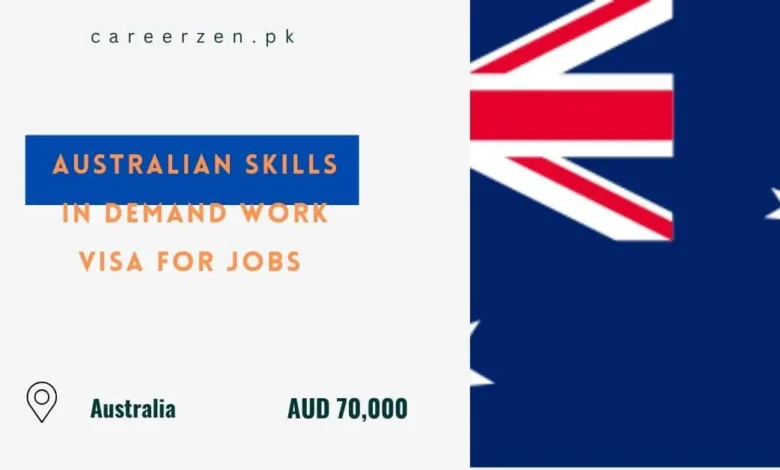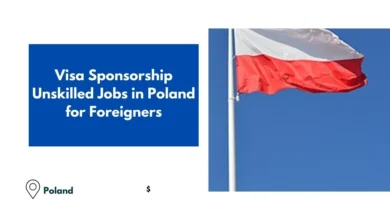Australian Skills in Demand Work VISA for Jobs 2025

The new Australian Skills in Demand Visa will be available by the end. It is a big step forward for Australia’s plans to hire skilled foreign workers starting. This new skills-in-demand visa for Australia is meant to better match skilled foreign workers with jobs in Australia. It is part of a larger change in immigration policy meant to boost innovation and economic growth.
Overview of the Skills in Demand Visa
The Australian government announced this visa as part of a larger migration strategy to deal with skill gaps and make it easier for global talent to move around and stay in Australia. It’s meant to take the place of the Temporary Skill Shortage (subclass 482) visa and make skilled immigration easier and more flexible.
Read Also: Factory Worker Jobs in Australia For Foreigners Visa Sponsors
Three Pathways for Skills in Demand Visa are Announced
The Skills People Want Visa offers three separate ways to get into the country, each suited to a different level of skill and salary:
- Specialist Skills Pathway: Designed for top workers who make more than AUD 135,000 a year. This path is for people with a lot of skills who work in important jobs, and it only takes about 7 days to get a visa. It aims to bring in experts who can make a big difference in the Australian economy, but it doesn’t let in tradespeople, machinery operators, drivers, or laborers.
- Core Skills Pathway: Professionals whose yearly pay is between AUD 70,000 and AUD 135,000 and who work in jobs on the newly created Core Skills Occupation List. Jobs and Skills Australia is in charge of this list, which is all about filling important jobs in the labour market.
- Essential Skills Pathway: This road is still being worked on, and it will be for people who make less than AUD 70,000 a year and work in important jobs, like those in disability services and aged care. Its goal is to make sure that job standards are high and that gaps in the
Benefits
- Extended Visa Validity: The visa is good for up to 4 years, so skilled workers can come to the United States for a longer time.
- Faster Processing Times: The visa program is meant to make the immigration process easier by giving applicants faster handling times.
- Increased Job Security: Visa holders have up to 180 days to find new work if they lose theirs. This gives them some job security and freedom.
- Clear Pathways to Permanent Residency: The visa program makes it easy to become a permanent resident, which makes it a good choice for people who want to stay in Australia for a long time.
- Access to Skill Shortage Areas: The visa is aimed at people with skills that are in high demand in Australia. It gives skilled workers the chance to help areas that are short on trained professionals.
- Employment Opportunities: Immigration visa holders can find work in many different fields, which helps Australia’s business and workforce.
- Healthcare and Social Benefits: People with visas can also use the same social and medical services as Australian citizens, which can improve their quality of life generally.
- Family Sponsorship: Depending on the type of visa, people who have one may be able to bring family members to Australia with them. This helps families get back together.
Requirement
- Occupation Eligibility: For the subclass 482 visa, the applicant’s job must be on the list of skilled jobs that apply. The list could be different based on where you live and what skills are needed in your area.
- Skills Assessment: Applicants may need to go through a skills test by an appropriate assessing authority recognised by the Australian government. This depends on the job. This test makes sure that the applicant has the right skills and abilities for the job that was chosen.
- Employer Sponsorship: A person who wants to get a visa must have an Australian company sponsor them. The employer must be a recognised sponsor and put forward the applicant for a job that is on the list of skilled occupations and meets certain standards for salary, working conditions, and the real need for the job.
- English Language Proficiency: Applicants must show that they can speak and write English at the required level. Usually, this is done by getting certain numbers on a recognised English language test like the IELTS, TOEFL, or PTE Academic.
- Health and Character Requirements: Applicants must meet standards for their health and behavior. In order to do this, they have to get a medical test to check their health and show police clearance certificates from any countries in the last 10 years where they lived for more than 12 months.
- Work Experience and Qualifications: Those who want to apply must have the right work experience and skills for the job they are applying for. The exact requirements may change depending on the job and the rules set by the evaluating body.
- Genuine Temporary Entrant: People who want to get a visa must show that they really want to stay in Australia for a short time and follow the rules of the visa. They shouldn’t plan to use the visa as a way to get permanent residency before they meet the standards for doing so.
- Salary and Employment Conditions: The sponsoring company must pay at least the going rate for the job being considered and follow all Australian workplace laws. The terms and conditions of the job should also be in line with any appropriate industrial awards or agreements.
- Health Insurance: Visa users usually have to make sure they have enough health insurance for themselves and any family members who come with them while they are in Australia.
Benefits
- Prospects for Employment: Access to a diverse array of employment opportunities in sectors that are currently experiencing skill shortages, including healthcare, engineering, IT, and trades.
- Work Rights: Visa holders are permitted to work for an approved employer in Australia, which offers a legal framework for employment and stability.
- Permanent Residency Pathway: Workers may be eligible to apply for permanent residency through the Employer Nomination Scheme (ENS) or other pathways after holding the TSS visa for a specified period.
- Family Inclusion: Visa holders are permitted to include their family members (spouse/partner and children) in their application, which enables them to reside and work in Australia.
- Education Accessibility: Families that relocate to Australia may derive substantial advantages from the availability of education and training opportunities for their dependents.
- Salary Increases: The industry and occupation of skilled workers may determine the salary they receive in comparison to comparable positions in their home countries.
Visa Requirement
General Eligibility
Age Requirement
- When you apply for the visa, you have to be younger than 45 (certain roles or circumstances may allow an exception).
English Language Proficiency
- You must establish that you are proficient in English, which is typically at least IELTS 6.0 in each band or the equivalent on other recognized tests like the PTE or TOEFL.
- You might not be required to take the language test if you are from a nation where English is the primary language.
Skills Assessment
- For the job you’re applying for, you must have a good skills evaluation. This entails having an Australian evaluating authority evaluate your work history and qualifications for your occupation.
- The assessing authority may vary depending on your profession. For example:
- Engineers might be assessed by Engineers Australia.
- Nurses might be assessed by the Nursing and Midwifery Board of Australia (NMBA).
- IT professionals are usually assessed by ACS (Australian Computer Society).
Occupation on the Relevant Skills List
- One of the Medium and Long-term Strategic Skills Lists (MLTSSL) or the Skilled Occupation Lists (SOL) must include your line of work. The following occupations are on the list because they are highly sought after in Australia:
- Healthcare workers (doctors, nurses, etc.)
- Engineers (civil, electrical, mechanical, etc.)
- IT professionals (software engineers, developers, etc.)
- Tradespeople (plumbers, electricians, carpenters, etc.)
- Teachers
- Accountants
Points Test
- Based on a number of factors, you have to reach a minimum point total. The subclass 189 and subclass 190 visas are subject to the points test, which takes into account things like:
- Age
- English language ability
- Work experience in a skilled occupation
- Educational qualifications
- Australian study qualifications (if applicable)
- Nominations (for subclass 190 and 491)
To apply for a Skilled Independent Visa (subclass 189), you must have at least 65 points. However, your chances of receiving an invitation to apply increase with the number of points you receive.
Health and Character Requirements
- You must meet health and character requirements.
- You will likely need to undergo a medical examination.
- A police clearance certificate may be required from your home country and any country where you have lived for 12 months or more in the past 10 years.
Conclusion:
With the new Australian Skills in Demand Visa, skilled foreign workers will have great chances to help Australia’s economy and fill important job roles. This visa is great for skilled workers because it lets them stay in the country permanently, extends the validity of their visa, and speeds up the processing time.
But applicants must meet strict requirements, such as being able to work in the desired field, having their skills evaluated, having a company sponsor them, being able to speak and write English well, meeting health and character standards, having work experience, being paid enough, and being a genuine temporary entrant.
Frequently Asked Questions
-
What benefits does the Australian Skills in Demand Visa offer?
The visa provides extended validity, faster processing times, increased job security, pathways to permanent residency, access to skill shortage areas, employment opportunities, healthcare and social benefits, and family sponsorship options.
-
When will the new Australian Skills in Demand Visa be available?
The visa is set to be available by the end of 2024, aligning with Australia’s plans to attract skilled foreign workers starting in 2025.
-
Which skilled worker is in demand in Australia?
Health Care and Social Assistance (252,600 jobs by 2023) Professional, Scientific & Technical Services (172,400 jobs by 2023) Education and Training (113,700 jobs by 2023) Construction (118,800 jobs by 2023)



